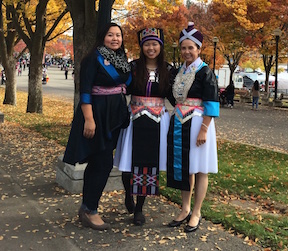This post originally appeared on the SEARAC blog.
by Nkauj Iab Yang
 Like many Hmong parents, my parents, Soua Toua Yang and Song Vang, came to the United States as Hmong refugees. By the age of 13, my dad was a soldier of the Central Intelligence Agency’s Secret Army in Laos. He and my mom married young. In the late 1970s, my parents came to the United States together, at the ages of 18 and 23. My parents landed in San Francisco, California, but quickly moved around the United States to reunite with family. I was born in Denver, Colorado, the youngest and only daughter of six children. My parents moved us to Sacramento, California, where they found blue-collar jobs and a community in which to raise my brothers and me.
Like many Hmong parents, my parents, Soua Toua Yang and Song Vang, came to the United States as Hmong refugees. By the age of 13, my dad was a soldier of the Central Intelligence Agency’s Secret Army in Laos. He and my mom married young. In the late 1970s, my parents came to the United States together, at the ages of 18 and 23. My parents landed in San Francisco, California, but quickly moved around the United States to reunite with family. I was born in Denver, Colorado, the youngest and only daughter of six children. My parents moved us to Sacramento, California, where they found blue-collar jobs and a community in which to raise my brothers and me.
While in college, I came across a poem that helped put into perspective my commitment to serve my community. In her 1980 Poem for South African Women, June Jordan stated, “we are the ones we have been waiting for.” Although I didn’t know the saying when I was younger, I quickly learned that if I want positive change in an unjust situation or system, that I would have to stand up and be that change. All the discomfort I felt and experienced — as a young woman, a Hmong American, a Southeast Asian American, a daughter, a student, a low-income youth — were all disempowered experiences full of discrimination. The times I felt powerful were when I spoke and stood up for love, equity, and took matters into my own hands. I want to continue feeling powerful, and I want the same for my community.
The last 10 years, I committed myself to youth organizing and youth development work both in Sacramento and Oakland, but mainly Oakland. Some organizations include Serve The People Oakland, Sacramento Serve The People, Youth Together, and Banteay Srei. Banteay Srei is the last organization I worked at, where I oversaw programs and services for Southeast Asian young women impacted by sexual exploitation. Through Banteay Srei, I also worked in collaboration with other organizations and the Oakland Unified School District school board to pass a resolution to expand and report disaggregated Asian American and Pacific Islander data. I have also served as a volunteer facilitator with the Asian Prisoner Support Committee’s ROOTS program inside San Quentin State Prison, leading discussions regarding Southeast Asian History, Intergenerational Trauma and Healing, and Women’s Rights.
There are so many stories out there that parallel and intersect with mine. I know that sometimes we did not choose this work because it excites us; instead we choose this work because we love our community and know that it is our duty to serve the people.
The opinions expressed in this article are those of the author and do not necessarily reflect those of the Diverse Elders Coalition.

